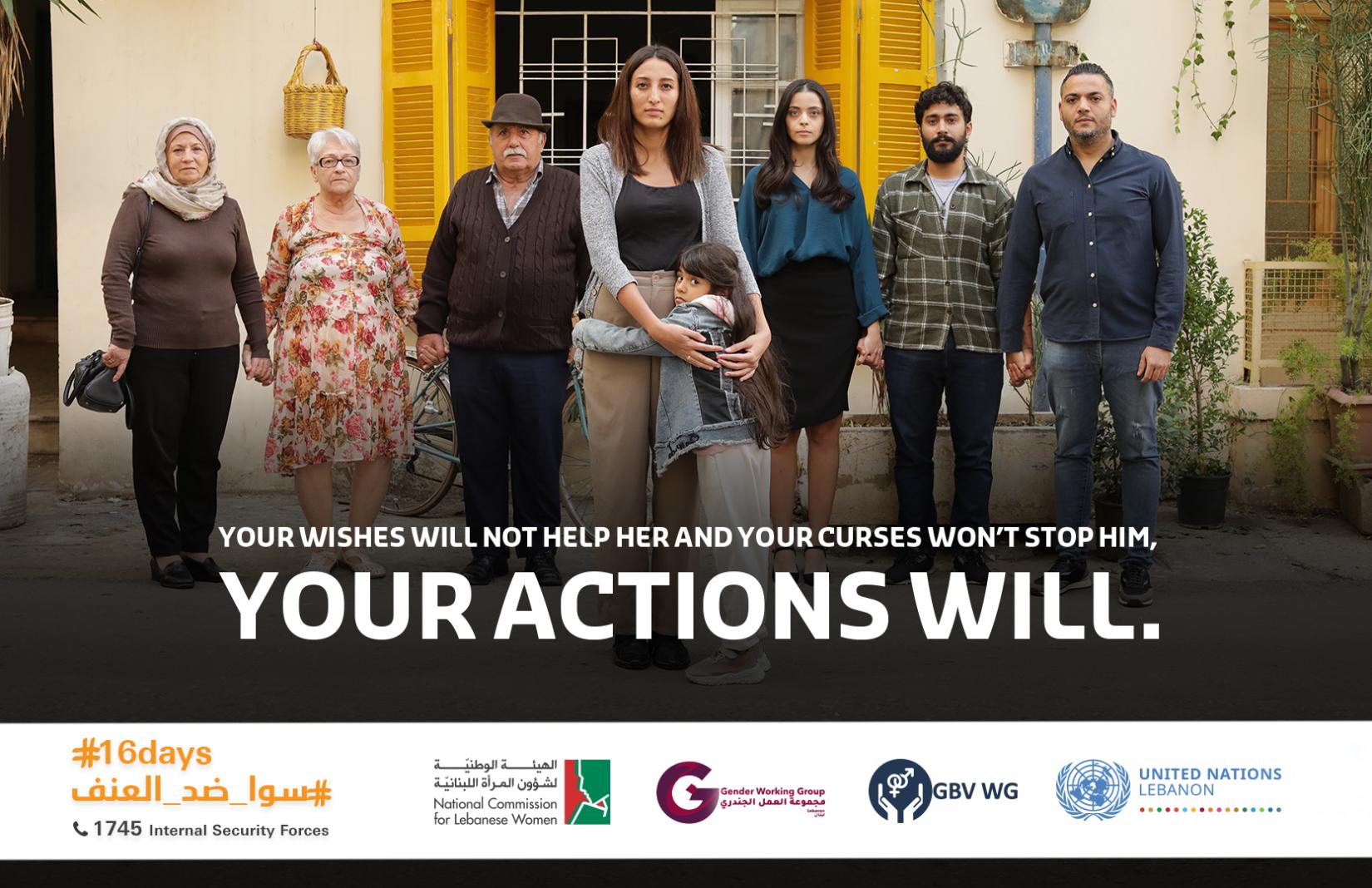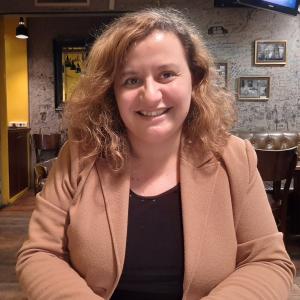LAUNCH OF A 16-DAY CAMPAIGN AGAINST GENDER-BASED VIOLENCE CELEBRATING THE WOMEN’S RIGHTS MOVEMENT IN LEBANON AND THE IMPORTANCE OF ACTIVISM FOR GENERATING CHANGE
25 November 2022
- Beirut, Lebanon -- Friday, 25 November 2022 (United Nations, GBV WG, GWG and NCLW) - Today begins the global 16 Days of Activism against Gender-Based Violence (GBV) (25 November -10 December). On this occasion, the United Nations System in Lebanon, the Gender Working Group (GWG), the Gender-Based Violence Working Group (GBV WG) and the National Commission for Lebanese Women (NCLW) are joining forces, to create awareness and momentum to prevent and eliminate Violence against Women and Girls (VAWG) and catalyze change.

VAWG remains the most widespread and pervasive human rights violation worldwide affecting more than an estimated 1 in 3 women0F[1] a figure that has remained largely unchanged over the last decade1F[2] .The most recent global estimates show that, on average, a woman or girl is killed by someone in her own family every 11 minutes.2F[3]
This year, the United Nations system in Lebanon, with partners are implementing a campaign that aims to serve as a call to action to mobilize partners, stakeholders, individuals, and the public at large to engage in activism to prevent violence against women and girls. Articulated around the theme, “UNITE! Activism to End Violence against Women & Girls”, it invites everyone to be an activist by taking a public stand against VAWG in local communities, and through joining women’s rights movements and activists.
“We call on women to live free from fear. Any assault on their dignity is punishable, even if it was committed by a close relative. The security forces protect women affected by violence and filing a complaint against the perpetrator of violence will deter further abuses. Keeping silent about violence at home, is not a virtue", said Mrs. Claudine Aoun, President of the National Commission for Lebanese Women.
“We all have a duty to act to end all forms of gender-based violence, particularly against women. The 16 days of activism are a reminder that we should not be silent to such a violation of women’s basic right to live in dignity, free from violence and fear”, said Ms. Joanna Wronecka, the UN Special Coordinator for Lebanon. “Lebanon’s recovery and building a better future for the country and its citizens depends to a large extent on empowering women and giving them the space to enjoy their full rights as active partners in society. The United Nations stands ready to support Lebanon in this process”, the Special Coordinator added.
The campaign, which will run for 16 days, from 25 November till 10 December, consists of a social media campaign - with the #16days and #سوا_ضد_العنفhashtags- showcasing 16 men, women and girls from all walks of life across Lebanon standing in solidarity with women’s rights activists, supporting feminist movements and calling for engagement in activism to prevent and end VAWG. It will include a video and a series of social media posts calling for everyone’s commitment to protecting women and girls.
Women’s rights activism and advocacy are key to ending VAWG and have successfully generated important legislative protection gains throughout the last decade, in Lebanon, while strengthening service delivery. Activism and advocacy have contributed to putting this topic on the political agenda, to strengthening laws and policies, essential services and prevention strategies.
“Ending Gender-based violence requires the commitments and actions of all”, said Imran Riza, United Nations Deputy Special Coordinator, Resident, and Humanitarian Coordinator for Lebanon. “It is fundamentally wrong that harmful gender stereotypes and norms, structural inequality, and discrimination are still affecting women and girls in Lebanon. This requires transformative actions by all of us to stamp out and prevent this violence” he added.
The international campaign 16 Days of Activism Against Gender-Based Violence originates from the 1991 first Women's Global Leadership Institute and raises awareness and increases momentum toward ending violence against women and girls worldwide. In support of the civil society–led, 16 Days of Activism against Gender-based Violence campaign the UN Secretary-General’s UNiTE by 2030 to End Violence against Women campaign (UNiTE), launched in 2008, calls for global action to increase awareness, galvanise advocacy efforts and share knowledge and innovations to end VAWG once and for all.
_______________________________________
The United Nations system in Lebanon comprises 30 agencies, funds and programmes as well as a peacekeeping mission, a political mission and a regional commission that cover a broad spectrum of peacekeeping, political, development, human rights and humanitarian work in Lebanon. The United Nations supports Lebanon to promote the country’s long-term peace and security, development and human rights priorities.
The National Commission for Lebanese women (NCLW) is an official institution established by law at the Presidency of the Council of Ministers in 1998 with the aim of promoting the status of women and ensuring equal opportunities for women and men. Its General Assembly is composed of personalities who are known for their activities related to women's affairs and is chaired by the woman delegated by the President of the Republic.
The Commission carries out consultative functions at the Presidency of the Government and public administrations and institutions, as well as liaison and coordination functions with various administrations, institutions, public, community and civic organizations and Arab and international organizations. The Commission also performs various executive functions, including the formulation of strategies and plans.
The Gender-Based Violence Working Group (GBV WG) comprises UN agencies and national and international NGOs, women organizations dedicated to carry out GBV activities in Lebanon alongside MOSA and other relevant government authorities. It aims at supporting a comprehensive and coordinated approach to GBV, including prevention, care and support, and efforts to allow survivors to access justice. The GBV working group also prioritizes life-saving activities and gap-filling as well as enhancing predictable and effective prevention, risk mitigation and response. The group, chaired by UNFPA, UNHCR and MOSA contributes to a shared vision and integrated strategies among humanitarian stakeholders to better address GBV through a survivor-centered and rights-based approach
The Gender Working Group (GWG) in Lebanon, chaired by UN Women, is a strategic forum and advocacy platform to promote gender equality and the integration of gender considerations in humanitarian-development-peace (HDP) actions of the United Nations and their partners in Lebanon. The GWG regularly convenes both international and national actors from across sectors to facilitate action on gender equality and women’s rights. The Gender Working Group is made up of 42 members (UN agencies: 19, INGOs: 6, and NGOs: 17); 15 member states collaborate with the group in an observatory status capacity. This group is complementary to the Gender Donor Working Group, chaired by the Government of Canada in Lebanon.
Media Contacts:
Roula Rached, Communications and Advocacy Specialist, UN Women, phone number: + 961 70351088
Micheline Elias Massaad, NCLW Executive Director, phone number: + 961 3 452 570
Pamela Di Camillo, Humanitarian/GBV Coordinator, United Nations Population Fund, Phone number: +96176482273
[1] Across their lifetime, 1 in 3 women, around 736 million, are subjected to physical or sexual violence by an intimate partner, non-partner or both (Violence against Women Prevalence Estimates), however, this figure would be even higher if it included the full continuum of violence that affects women and girls including sexual harassment, violence in digital contexts, harmful practices and sexual exploitation.
[2] WHO (2021) Violence against Women Prevalence Estimates
[3] UNODC (2021) Killings of women and girls by their intimate partner or other family members. Global estimates 2020


